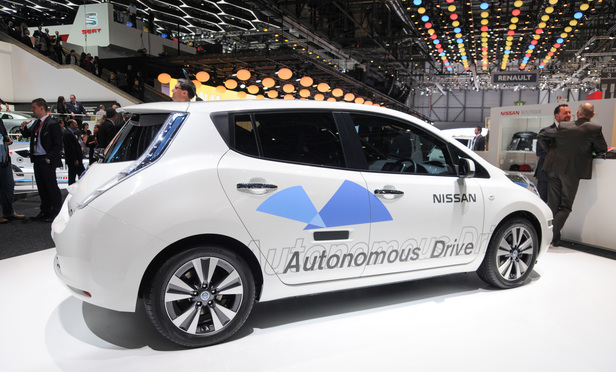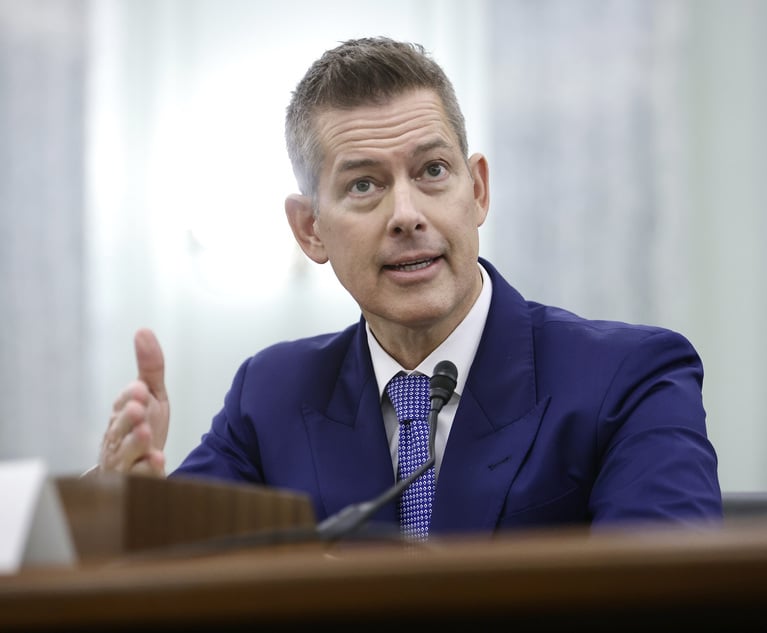With Laws for Autonomous Cars, It's Pedal to the Metal
America's race to put "self-driving" cars on the road is expected to accelerate in 2017 as more state and federal regulators come out with rules governing their testing and operation. Industry lawyers should get in the driver's seat.
April 19, 2017 at 03:12 PM
3 minute read
The original version of this story was published on Corporate Counsel
 Nissan autonomous car prototype (using a Nissan Leaf electric car) exhibited at the Geneva Motor Show 2014. (Photo: Norbert Aepli, Switzerland Wikimedia)
Nissan autonomous car prototype (using a Nissan Leaf electric car) exhibited at the Geneva Motor Show 2014. (Photo: Norbert Aepli, Switzerland Wikimedia)
America's race to put “self-driving” cars on the road is expected to accelerate in 2017 as more state and federal regulators come out with rules governing their testing and operation.
Industry lawyers should get in the driver's seat.
“You'll see more of a partnership in the development of regulations than you have in the past,” says Christine Soares, a partner at Cozen O'Connor in Cherry Hill, New Jersey. “For carmakers, making sure they're involved in those different task forces, either at the federal or state level, is going to be important for them.”
Autonomous vehicles aren't just the brainchild of Tesla and Google; most of the major automakers hope to sell them in the next few years. Regulators are scrambling to keep pace with the technology. Since 2012, 10 states have enacted regulations for driverless cars, either by law or through executive orders, according to the National Conference of State Legislatures. But the regulations aren't all alike. Some states have required licensed drivers to be behind the wheel, some don't. Some address testing and studies, while others govern liability.
Next year could see a push for greater consistency, especially after the U.S. National Highway Traffic Administration in September announced a set of voluntary guidelines for autonomous vehicles, including a model policy for states. There is a definite difference in the roles between the states and federal and local governments in this, but the key is because it's a completely new frontier and a new way of looking at things, the state, local and federal governments are going to have to work together—much like they did when vehicle laws came out when automobiles were invented,” says Anne Teigen, policy specialist at the National Conference of State Legislatures.
Critics have safety concerns, despite assurances from industry leaders that autonomous vehicles would make the roads less dangerous. At least one person has died in a Tesla vehicle. The NHTSA's safety guidelines prompted Silicon Valley entrepreneur George Holtz to halt sales of his proposed $999 self-driving device.
That said, the federal rules could be more favorable to carmakers under President-elect Donald Trump, who has vowed to reduce regulations.
And in some states, auto manufacturers already have taken a front seat. In California, a coalition led by Google and Uber have pushed back against regulations they considered too stringent and onerous. In Pennsylvania, a task force for autonomous vehicle regulations includes representatives from Uber, which already has cars on the road in Pittsburgh. Uber knows a thing or two about “breaking into the industry and defining what they are,” Soares says. “And then having the laws and regulations follow their own definition.”
This content has been archived. It is available through our partners, LexisNexis® and Bloomberg Law.
To view this content, please continue to their sites.
Not a Lexis Subscriber?
Subscribe Now
Not a Bloomberg Law Subscriber?
Subscribe Now
NOT FOR REPRINT
© 2025 ALM Global, LLC, All Rights Reserved. Request academic re-use from www.copyright.com. All other uses, submit a request to [email protected]. For more information visit Asset & Logo Licensing.
You Might Like
View All


DOT Moves to Roll Back Emissions Rules, Eliminate DEI Programs

Elon Musk’s Tesla Pay Case Stokes Chatter Between Lawyers and Clients
7 minute readTrending Stories
- 1Public Notices/Calendars
- 2Wednesday Newspaper
- 3Decision of the Day: Qui Tam Relators Do Not Plausibly Claim Firm Avoided Tax Obligations Through Visa Applications, Circuit Finds
- 4Judicial Ethics Opinion 24-116
- 5Big Law Firms Sheppard Mullin, Morgan Lewis and Baker Botts Add Partners in Houston
Who Got The Work
J. Brugh Lower of Gibbons has entered an appearance for industrial equipment supplier Devco Corporation in a pending trademark infringement lawsuit. The suit, accusing the defendant of selling knock-off Graco products, was filed Dec. 18 in New Jersey District Court by Rivkin Radler on behalf of Graco Inc. and Graco Minnesota. The case, assigned to U.S. District Judge Zahid N. Quraishi, is 3:24-cv-11294, Graco Inc. et al v. Devco Corporation.
Who Got The Work
Rebecca Maller-Stein and Kent A. Yalowitz of Arnold & Porter Kaye Scholer have entered their appearances for Hanaco Venture Capital and its executives, Lior Prosor and David Frankel, in a pending securities lawsuit. The action, filed on Dec. 24 in New York Southern District Court by Zell, Aron & Co. on behalf of Goldeneye Advisors, accuses the defendants of negligently and fraudulently managing the plaintiff's $1 million investment. The case, assigned to U.S. District Judge Vernon S. Broderick, is 1:24-cv-09918, Goldeneye Advisors, LLC v. Hanaco Venture Capital, Ltd. et al.
Who Got The Work
Attorneys from A&O Shearman has stepped in as defense counsel for Toronto-Dominion Bank and other defendants in a pending securities class action. The suit, filed Dec. 11 in New York Southern District Court by Bleichmar Fonti & Auld, accuses the defendants of concealing the bank's 'pervasive' deficiencies in regards to its compliance with the Bank Secrecy Act and the quality of its anti-money laundering controls. The case, assigned to U.S. District Judge Arun Subramanian, is 1:24-cv-09445, Gonzalez v. The Toronto-Dominion Bank et al.
Who Got The Work
Crown Castle International, a Pennsylvania company providing shared communications infrastructure, has turned to Luke D. Wolf of Gordon Rees Scully Mansukhani to fend off a pending breach-of-contract lawsuit. The court action, filed Nov. 25 in Michigan Eastern District Court by Hooper Hathaway PC on behalf of The Town Residences LLC, accuses Crown Castle of failing to transfer approximately $30,000 in utility payments from T-Mobile in breach of a roof-top lease and assignment agreement. The case, assigned to U.S. District Judge Susan K. Declercq, is 2:24-cv-13131, The Town Residences LLC v. T-Mobile US, Inc. et al.
Who Got The Work
Wilfred P. Coronato and Daniel M. Schwartz of McCarter & English have stepped in as defense counsel to Electrolux Home Products Inc. in a pending product liability lawsuit. The court action, filed Nov. 26 in New York Eastern District Court by Poulos Lopiccolo PC and Nagel Rice LLP on behalf of David Stern, alleges that the defendant's refrigerators’ drawers and shelving repeatedly break and fall apart within months after purchase. The case, assigned to U.S. District Judge Joan M. Azrack, is 2:24-cv-08204, Stern v. Electrolux Home Products, Inc.
Featured Firms
Law Offices of Gary Martin Hays & Associates, P.C.
(470) 294-1674
Law Offices of Mark E. Salomone
(857) 444-6468
Smith & Hassler
(713) 739-1250








